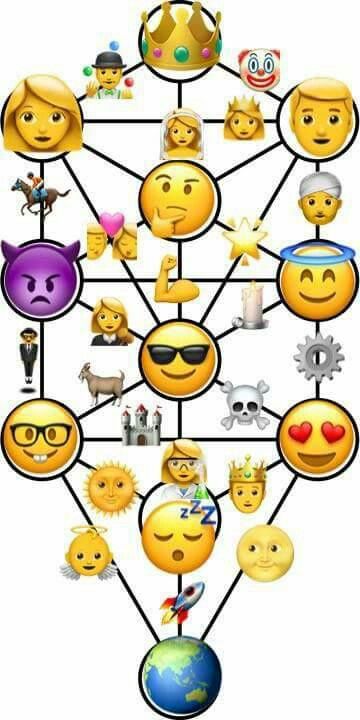
S:C
-
Content count
516 -
Joined
-
Last visited
-
Days Won
1
Posts posted by S:C
-
-
Are all three pillars ‚humane‘? (As in residing in a human spirit?)
-
13 hours ago, Nungali said:my take is a little different ; I see justice as the principle ( the 'dao' part ) and mercy and severity as the polarities (the yin and the yang ) . Justice is cruelly unbalanced if it is too severe and justice is also unbalanced is it becomes too merciful .
How can there be any deviance from the principle (the dao part) anyhow?
-
First questions first: Are the fruits on the cards of the high priestess pomegranates?
-
 1
1
-
-
-
15 hours ago, blue eyed snake said:only after the ego has developed to a stable and happy baseline is it possible to let go of it, very slowly
interesting…

-
On 16.4.2024 at 10:30 PM, forestofemptiness said:It is interesting that Advaitins have to contend with the idea that things are impermanent and constantly changing, whereas Buddhists have to contend with the idea that things are enduring and lasting! I suppose it depends on how one tunes the mind.
I am a little rusty in the lingo. Especially with the Advaitins. And I lack understandable explanations - which are not available in my language, as far as I see.
Where do the concepts of „substantiality“ differ concerning svabhava… ?
@dwai could you provide us with a translation of
QuoteSo interesting. Yet it is the Buddhists who say “kshanikam kshanikam sarvam kshanikam” and the advaitins who say, “sarvam khalu idam
brahma”
please? (Don‘t know how or why this got an orange colouring…)
So the Advaitins despite their focus on impermanence see ‚God‘ while the Buddhists do not?
Empty of substance in both views?
-
16 minutes ago, Taomeow said:This echoes something
Would you be able and willing to give a reference for this quote please?
-
Does anyone else find it funny that the measurement unit for high impedance is called ohm? I wonder whether good old Georg did some meditation on his last name.
-
 1
1
-
 1
1
-
-
7 minutes ago, Apech said:understandably… explainerly
Is this not a word in the English language?

sorry… there should be one like this. there it is…
-
 1
1
-
-
3 minutes ago, Apech said:
I can’t understand it explainerly.When treaded categories fall away, the search for structure continues for the functional mind. Garfield/Priest discuss it nicely, Why mountains are mountains or the like… (I forgot).
-
 1
1
-
-
無?
https://en.m.wikipedia.org/wiki/Mu_(negative)mu is translated as "no thing", saying that it meant "unask the question". He offered the example of a computer circuit using the binary numeral system, in effect using mu to represent high impedance:
For example, it's stated over and over again that computer circuits exhibit only two states, a voltage for "one" and a voltage for "zero." That's silly! Any computer-electronics technician knows otherwise. Try to find a voltage representing one or zero when the power is off! The circuits are in a mu state.[22]
-
22 minutes ago, Apech said:
I am being thick - I really can’t follow what you are saying.Sorry, I cannot explain it understandably.
-
 1
1
-
-
45 minutes ago, idiot_stimpy said:The mind is polarized and can swing any way you can imagine it to be. There is a saying, believe something long enough and it will be true.
That more how I understood it, @Apech Language (in that view) constitutes reality. Claiming an observation via language seems to constitute a different layer of reality (for lack of better words), in that view. To rely on feelings, wishes and personal needs and preference is therefore deemed ‚valid enough’, just as well as empirical sense data (both faulty, but necessary nonetheless).
A claim that is backed up, constitutes reality. Language is reality, then, not a map thereof.
Please correct me if I am wrong here.-
 1
1
-
 2
2
-
-
6 hours ago, Taomeow said:Q: when did the difference between "sex" and "gender" in humans enter the discourse in the current understanding, and who proposed this usage, and what was it based on?
Judith Butler is the name I associate with your question. It might be, that there has been someone before, who proposed that conceptual change and also the linguistic turn, but she made the most noise. So it seems to rely on the concept of a performative model of gender, e.g. it relies on language theory (‚performative‘), which originated in the wake of Austin, Searle etc. An act of speaking is conceptually separated into several sub acts, where one of them is ‚illocutionary‘, e.g. creates a reality of itself through speaking, as empirical sense data is frowned upon as a reliable source for observation, language instead is used as the source. Or so I understood it.
-
 1
1
-
 2
2
-
 1
1
-
-
14 hours ago, Nungali said:My definition is on 7 levels; a man should have '7 heads' . But I won't go into that here ..... off topic .
I will say however that in some of these systems , what 'makes you a man' might be considered effeminate in some western views . Eg . in the Samurai tradition , you are not a 'real man' unless you can arrange a nice bunch of flowers (ikibana ) , appreciate nature and beauty , write beautiful and meaningful poetry , and in a beautiful calligraphic style and spend some time on your hairdo and facial make up
Would you care to make it a topic?

-
On 10.4.2024 at 6:18 AM, Daniel said:Wouldn't that bring peace?
I tend to disagree.
whatever truth might be reached may still feel warlike and painful, considering the boundaries would get only get dimmer or thinner then… (not fully disappearing) while not ready for dissolution if that makes sense at all.
-
4 hours ago, SirPalomides said:he is bringing intracommunal conflict and it's not going to be pretty
because?
his perspective is/was provocative to the then common/current standard? what are you referring to exactly? -
22 hours ago, Daniel said:The sword = division
Differentiation.
Seems contradictory to the approach for reuniting with God, no?And to Matthew 7:1: Judge not lest you be judged. (By the same standards maybe.)
A purification of sorts through the process of differentiation for a clearance of sorts? Odd.
-
41 minutes ago, stirling said:In this case I mean:
• Practices (or teachings) that are in "harmony" or lead to harmony (enlightenment).
• ALL "phenomena" that appear in our experience which are themselves already in harmony (enlightened), and are actually teachings themselves.
The "dharmakaya" is the term for the space in which all phenomena appear. It is also considered to be the "teaching body" of the Buddhas. These are the two facets of the word "dharma" I am speaking specifically about
Thank you for your explanation @stirling, I had read the article on wiki before, but it seems to have a very wide array of meanings and I was baffled at the plural. It’s clearer now!

-
 1
1
-
-
What’s “logos” in your view? @Apech
Reason, rationality, differentiating abilities of the mind, grasping word concepts? -
1 hour ago, Gerard said:Lovely, amusing reading, thanks!
@manitou, concerning
QuoteDoes anyone here ever wonder if 'god' and DNA are the very same thing?
Someone here did,
and someone else whose user name I’ve forgotten, but who had a similar way of writing as the one above.
@stirling, what please is the concept of “all dharmas”, - isn’t there just one? Which definition or explanation can be given for this word concept?
-
34 “Do not think that I have come to bring peace to the earth. I have not come to bring peace, but a sword.
this has been wondering me for years now… what is the meaning of this sentence, is it related to perception?
-
3 hours ago, liminal_luke said:Even if nobody actually goes to prison, the threat of legal action throws a pall over free speech.
No way out of this, neither dead nor alive.
 I expect even thought conceptualizations will thus forcibly be moved accordingly, - perfidious - neither free speech, nor free thought might remain. Regardless of the topic. (Just remember a few years back or take a look at a different country that now experiences similar sanctions.)
I expect even thought conceptualizations will thus forcibly be moved accordingly, - perfidious - neither free speech, nor free thought might remain. Regardless of the topic. (Just remember a few years back or take a look at a different country that now experiences similar sanctions.)
Nothing will remain. If it’s experienced. Oblivion seems to be the only solid answer. Sitting and forgetting - strangely - might be the only sane reaction to this.-
 2
2
-
 1
1
-
-
Marvellous, how everyone has their own constant unique direct and unfailing and perception of ‘true reality‘ and ‘objectivity’! I do admire those who have it, life must be a lot easier….
-
 1
1
-


Boaz and Jachin
in General Discussion
Posted · Edited by S:C
It would seem that the differentiation between ‚four worlds‘ is arbitrary and not necessarily a consequence of the diagramm. Why are several spheres a world?
Is this intuitive or experiential gnowledge for you? (Seems I‘d need to take a look at that book of yours, bes! Seems very complex.)